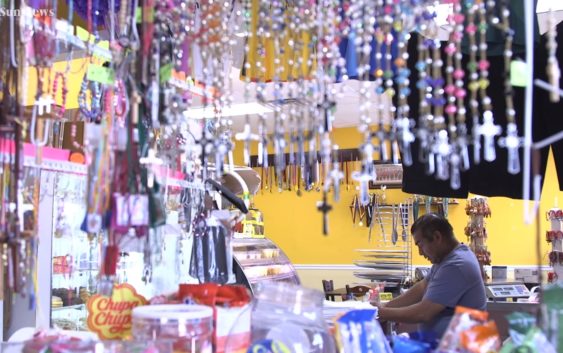- Some evacuations lifted as crews work to contain massive wildfire in Bastrop County
- Storm in the Caribbean is on a track to likely hit Cuba as a hurricane
- 400-acre wildfire near Bastrop State Park leads to evacuations
- Some evacuations lifted as crews work to contain massive wildfire in Bastrop County
- Crews work to contain massive wildfire in Bastrop County ahead of severe weather threat Monday night
For Latino community in Horry County, hurricane information isn’t always easy to find

Roberto Barriento Morales closed his popular Latino-foods store in Myrtle Beach for six days when he evacuated his home ahead of Hurricane Florence.
He lost at least $15,000 by temporarily shutting down Tortilleria Hermanos on Socastee Boulevard, but he didn’t want to take any chances with the storm, he said.
Morales said many Latino residents in Horry County, though, don’t heed emergency warnings about natural disasters. Now he’s urging those who live in flood-prone areas to get out as local rivers and the Intracoastal Waterway continue to rise and are expected to cause widespread flooding in the coming days.
“People in the community take it lightly,” Morales said in Spanish. “They think nothing bad will happen if other hurricanes did not affect them in the past, but not every storm is the same.”
Hurricanes and their aftermath pose dangers for everyone. But Latino residents often face additional challenges, including limited access to Spanish-language media coverage of the storm’s path, evacuations and flood warnings.
Latino residents in Horry County — about 6 percent of the total population — say they mostly rely on Facebook posts from friends and neighbors to stay informed. Shared information isn’t always accurate, they say, and it’s easy for rumors about immigration enforcement to spark fear.
“They’re all concerned about that,” said Ricky Garcia, 28, whose mother-in-law owns Carniceria Mi Mexico grocery store on Socastee Boulevard. “They don’t want to evacuate. They don’t want to go anywhere.”
Reynalda Garcia, who owns the store, said she watched coverage of Hurricane Florence on Telemundo, a Spanish-language television network. She and her family decided not to evacuate ahead of the storm, which made landfall Sept. 14 as a Category 1 hurricane.
The Federal Emergency Management Agency created a Spanish-language mobile app in 2014. Ricky Garcia said it’s helpful to many local Latino residents.
Emergency alerts on smart phones are typically in English, but 21-year-old Tony Lopez said the sound that accompanies the alerts represent danger in any language.
“They know what it means — ding,” Lopez said of those who don’t speak English.
Paulina Garcia, 24, who works at Los Amigos on Socastee Boulevard, said she translated into Spanish the relevant information about evacuations for the restaurant’s owner, who doesn’t speak English.
Paulina Garcia said she evacuated, missing several days of work.
“(But) a lot of people don’t, and that’s when they suffer, mostly,” she said.
As the Waccamaw and Little Pee Dee rivers and the Intracoastal Waterway rise, Morales urged Latinos to be prepared.
“I want to make a call to the Hispanic community to listen and obey the government’s warnings,” he said as he rang up customers Friday. “If we need to evacuate, we have to do it so that the storm doesn’t take us by surprise.”
‘Focused on response and recovery’
Authorities from U.S. Customs and Border Protection have been in North and South Carolina this week to help with storm-recovery efforts, The (Raleigh) News & Observer reported.
Meanwhile, The N&O reported that U.S. Immigration and Customs Enforcement said it wouldn’t be doing immigration enforcement in areas where people had to evacuate or go to emergency shelters because of the storm, unless there was “a serious public safety threat,” according to a statement released last week by the Department of Homeland Security.
In Raleigh, N.C., on Monday, Homeland Security Secretary Kirstjen Nielsen, whose agency includes both ICE and Customs and Border Protection, said “all of DHS is focused on response and recovery.”
Morales said Latino residents should not risk their personal safety because of immigration fears.
“In these situations I don’t think it’s relevant for us to talk about immigration,” he said. “Our lives and that of our children are at stake. I think they (the authorities) understand and help people evacuate.”
Camila Molina contributed.
Nagem: 919-829-4635; @sarah_nagem